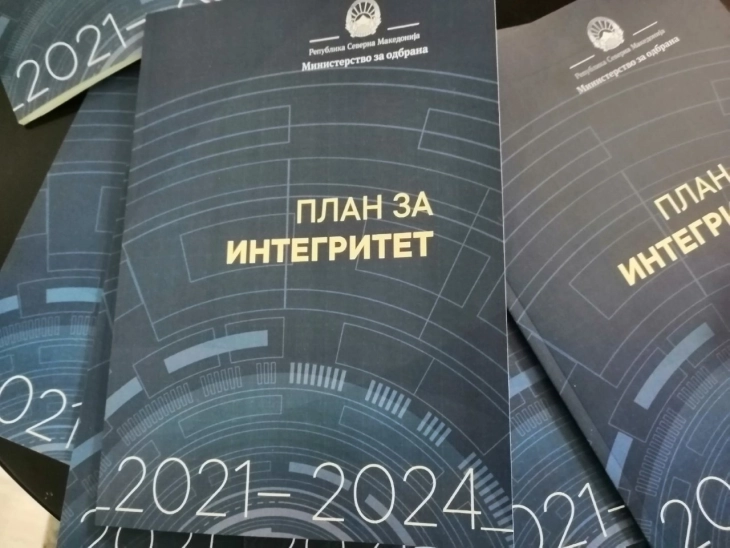Ministry of Defence presents Integrity Plan 2021-2024

Skopje, 30 September 2021 (MIA) – Minister of Defence Radmila Shekerinska and Norway’s Defence Attaché Dag-Magne Lunde presented on Thursday the Ministry of Defence’s new Integrity Plan 2021-2024, prepared in cooperation with the Norwegian Center for Integrity.
The Integrity Plan, Minister Shekerinska underlined, is not a formal obligation, but aims to leave no room for corruption in defence.
“Our vision is to develop a transparent defence sector, where integrity is guaranteed. Transparency and integrity are key for establishing resilient institutions and societies,” Minister Shekerinska stressed, adding that resilience is one of NATO’s latest priorities and entails resilience to crisis, imported issues, misinformation, etc.
The plan focuses on six areas – potential for improving situations, establishing human resources management system, preventing conflict of interest, eliminating risks of corruption during participation in international missions, strengthening integrity during public procurement and setting up stronger internal control mechanisms.
The plan also entails regular integrity trainings for all employees and introducing the concept of integrity, Shekerinska said, at the Military Academy.
She pointed out that the human resources management system will eliminate nepotism, clientelism and similar issues that can impact careers.
“Currently, job descriptions, and especially those in the Army, are classified information. The plan aims to conduct full analysis of the situation in NATO member states, which job descriptions should be classified and which information should be public. Based on this, we’ll propose legislative changes,” Shekerinska said at a press conference on Thursday.
The Minister underlined that greater focused will be put on corruption risks during participation in international missions and operations and briefed that next year an official policy will be drafted to identify possible risks. All operation participants, she added, will also get appropriate anti-corruption training.
Shekerinska said that all Army and Ministry job positions that are at risk of corruption will be identified and regular rotation of employees will be implemented in addition to the adoption of a rulebook for procurement during international missions and operations.
“We’ll improve regulation of the public procurement system and conduct more trainings for Ministry and Army workers,” the Minister noted, adding that North Macedonia can make use of NATO’s Procurement Agency.
Shekerinska also announced increased internal control, adding that trust in institutions is an important part of fight against corruption.
According to her, the existence of strong internal control mechanism is crucial and the Defence Ministry has two such control systems – defence inspection and internal revision.
The defence sector, the Minister said, has quickly become a leader in anti-corruption policies. She reiterated that the Ministry of Defence has been the most transparent institution in the country for the past two years, noting that Transparency International ranked North Macedonia second in Central and Eastern Europe as a result of its policy on fight against corruption, integrity and active transparency in the defence sector.
Shekerinska told reporters that of the plan’s six pillars, focus will be put on human resources and public procurement.
“If there’s a good system for career advancement and public procurement, conflict of interest will go down or be eliminated,” she said, stressing the importance of internal control.
The Minister underlined that all plans are part of the government’s general policy. A few months ago, she pointed out, the government asked all institutions to draft anti-corruption plans.
According to Norway’s Defence Attaché Dag-Magne Lunde corruption and other forms of unethical behavior can ruin the public’s trust in institutions and armed forces, which are usually one of the most secure public institutions in Europe, including in North Macedonia.
“Armed forces require continuous awareness-raising training and appropriate mechanisms and instruments, aimed at preventing and fighting corruption and building integrity,” Lunde said.
He added that an Action Plan containing 38 activities has been drafted. It entails clear deadlines and division of responsibilities, based on risk analysis. The plan is precise and requires taking action. It’s also in line with the government’s priorities for strengthening public administration integrity.
According to him, the plan is a valuable contribution for North Macedonia, Norway and the Alliance, as well as program for building integrity in NATO, which aims to strengthen integrity structures in all its institutions and institutions in member states.







